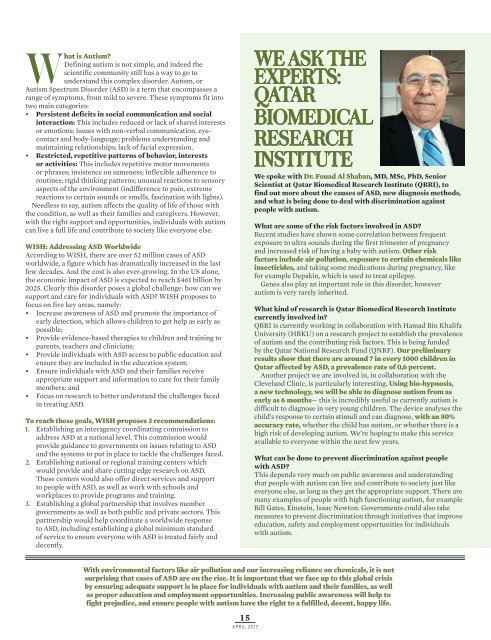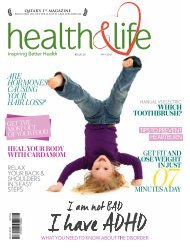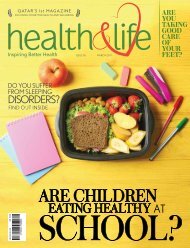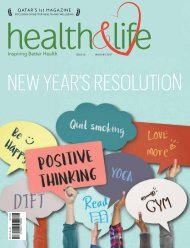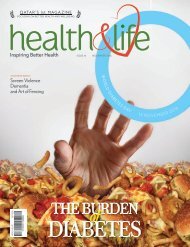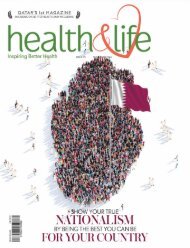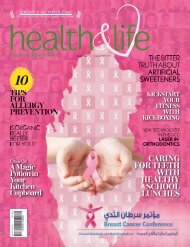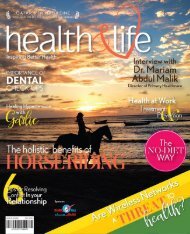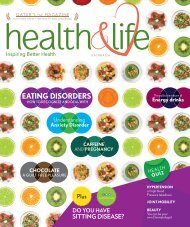Health & Life Magazine April 2017
Health & Life Magazine April 2017 www.health-n-life.com
Health & Life Magazine April 2017
www.health-n-life.com
Create successful ePaper yourself
Turn your PDF publications into a flip-book with our unique Google optimized e-Paper software.
W<br />
hat is Autism?<br />
Defining autism is not simple, and indeed the<br />
scientific community still has a way to go to<br />
understand this complex disorder. Autism, or<br />
Autism Spectrum Disorder (ASD) is a term that encompasses a<br />
range of symptoms, from mild to severe. These symptoms fit into<br />
two main categories:<br />
• Persistent deficits in social communication and social<br />
interaction: This includes reduced or lack of shared interests<br />
or emotions; issues with non-verbal communication, eyecontact<br />
and body-language; problems understanding and<br />
maintaining relationships; lack of facial expression.<br />
• Restricted, repetitive patterns of behavior, interests<br />
or activities: This includes repetitive motor movements<br />
or phrases; insistence on sameness; inflexible adherence to<br />
routines; rigid thinking patterns; unusual reactions to sensory<br />
aspects of the environment (indifference to pain, extreme<br />
reactions to certain sounds or smells, fascination with lights).<br />
Needless to say, autism affects the quality of life of those with<br />
the condition, as well as their families and caregivers. However,<br />
with the right support and opportunities, individuals with autism<br />
can live a full life and contribute to society like everyone else.<br />
WISH: Addressing ASD Worldwide<br />
According to WISH, there are over 52 million cases of ASD<br />
worldwide, a figure which has dramatically increased in the last<br />
few decades. And the cost is also ever-growing. In the US alone,<br />
the economic impact of ASD is expected to reach $461 billion by<br />
2025. Clearly this disorder poses a global challenge: how can we<br />
support and care for individuals with ASD? WISH proposes to<br />
focus on five key areas, namely:<br />
• Increase awareness of ASD and promote the importance of<br />
early detection, which allows children to get help as early as<br />
possible;<br />
• Provide evidence-based therapies to children and training to<br />
parents, teachers and clinicians;<br />
• Provide individuals with ASD access to public education and<br />
ensure they are included in the education system;<br />
• Ensure individuals with ASD and their families receive<br />
appropriate support and information to care for their family<br />
members; and<br />
• Focus on research to better understand the challenges faced<br />
in treating ASD.<br />
To reach these goals, WISH proposes 3 recommendations:<br />
1. Establishing an interagency coordinating commission to<br />
address ASD at a national level. This commission would<br />
provide guidance to governments on issues relating to ASD<br />
and the systems to put in place to tackle the challenges faced.<br />
2. Establishing national or regional training centers which<br />
would provide and share cutting edge research on ASD.<br />
These centers would also offer direct services and support<br />
to people with ASD, as well as work with schools and<br />
workplaces to provide programs and training.<br />
3. Establishing a global partnership that involves member<br />
governments as well as both public and private sectors. This<br />
partnership would help coordinate a worldwide response<br />
to ASD, including establishing a global minimum standard<br />
of service to ensure everyone with ASD is treated fairly and<br />
decently.<br />
WE ASK THE<br />
EXPERTS:<br />
QATAR<br />
BIOMEDICAL<br />
RESEARCH<br />
INSTITUTE<br />
We spoke with Dr. Fouad Al Shaban, MD, MSc, PhD, Senior<br />
Scientist at Qatar Biomedical Research Institute (QBRI), to<br />
find out more about the causes of ASD, new diagnosis methods,<br />
and what is being done to deal with discrimination against<br />
people with autism.<br />
What are some of the risk factors involved in ASD?<br />
Recent studies have shown some correlation between frequent<br />
exposure to ultra sounds during the first trimester of pregnancy<br />
and increased risk of having a baby with autism. Other risk<br />
factors include air pollution, exposure to certain chemicals like<br />
insecticides, and taking some medications during pregnancy, like<br />
for example Depakin, which is used to treat epilepsy.<br />
Genes also play an important role in this disorder, however<br />
autism is very rarely inherited.<br />
What kind of research is Qatar Biomedical Research Institute<br />
currently involved in?<br />
QBRI is currently working in collaboration with Hamad Bin Khalifa<br />
University (HBKU) on a research project to establish the prevalence<br />
of autism and the contributing risk factors. This is being funded<br />
by the Qatar National Research Fund (QNRF). Our preliminary<br />
results show that there are around 7 in every 1000 children in<br />
Qatar affected by ASD, a prevalence rate of 0,6 percent.<br />
Another project we are involved in, in collaboration with the<br />
Cleveland Clinic, is particularly interesting. Using bio-hypnosis,<br />
a new technology, we will be able to diagnose autism from as<br />
early as 6 months— this is incredibly useful as currently autism is<br />
difficult to diagnose in very young children. The device analyses the<br />
child’s response to certain stimuli and can diagnose, with an 80%<br />
accuracy rate, whether the child has autism, or whether there is a<br />
high risk of developing autism. We’re hoping to make this service<br />
available to everyone within the next few years.<br />
What can be done to prevent discrimination against people<br />
with ASD?<br />
This depends very much on public awareness and understanding<br />
that people with autism can live and contribute to society just like<br />
everyone else, as long as they get the appropriate support. There are<br />
many examples of people with high functioning autism, for example<br />
Bill Gates, Einstein, Isaac Newton. Governments could also take<br />
measures to prevent discrimination through initiatives that improve<br />
education, safety and employment opportunities for individuals<br />
with autism.<br />
With environmental factors like air pollution and our increasing reliance on chemicals, it is not<br />
surprising that cases of ASD are on the rise. It is important that we face up to this global crisis<br />
by ensuring adequate support is in place for individuals with autism and their families, as well<br />
as proper education and employment opportunities. Increasing public awareness will help to<br />
fight prejudice, and ensure people with autism have the right to a fulfilled, decent, happy life.<br />
15<br />
APRIL <strong>2017</strong>


